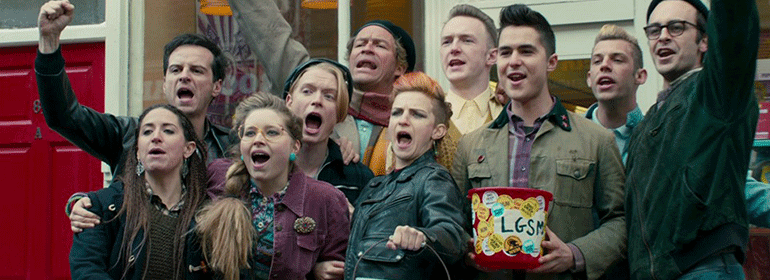Although Pride opts for a lighthearted take on some very real oppression and disenfranchisement in anti-gay 1980s UK, it’s no less tender and touching, says Alan Lambert.
Margaret Thatcher never had a great relationship with the trade unions, so when her government announced in early 1984 that in an effort to make the coal industry profitable they were to close 20 mines that year, with another 50 to follow, the National Union of Mineworkers went out on strike. Lasting just one day short of a year, the strikes were violent and passionate. They lead a number of families into poverty, and unfortunately for them, the public and media were not on the side of the strikers.
Meanwhile, the lesbian and gay community were still being treated as social pariahs and perverts. Just over 100 people in the UK had been diagnosed with (and in some cases had died from) AIDS, and like the miners, they were far from being the darlings of the media.
Pride is a film that brings these two seemingly disparate groups together. On the morning of London Pride in 1984. Mark Ashton (Ben Schnetzer) is watching a news bulletin featuring union leader, Arthur Scargill. Ashton notices the parallels between the treatment of the miners and his own situation, so arrives at the Pride march with buckets to begin a collection. His group became LGSM (Lesbians and Gays Support the Miners), and in real life would go on to be the largest supporters of the mining strike raising over £11,000, which was mainly down to the organisation of a benefit concert, ‘The Pits and The Perverts’.
Primarily told from the point of view of Joe aka Bromley (George Mackay), a closeted student and one of the film’s only fictitious characters, Pride is an emotional rollercoaster with an outstanding cast (including Paddy Considine, Imelda Staunton and Joseph Gilgun), a strong script and an engrossing story. It’s also romantic comedy, but not in the traditional sense. It’s a romance between two seemingly disparate groups.
At its core is a story about solidarity and friendship, that doesn’t shy away from the hypocrisy or pure hatred aimed towards both groups. The film evokes strong feelings from subtle and measured performances, and I’m not ashamed to say I was close to tears on a number of occasions.
Considering the film uses a degree of artistic license, including the introduction of fictitious characters, the only disappointment is that the villain of the piece doesn’t get suffer a deserved comeuppance. Scenes depicting LGSM’s assistance initially being rejected by the National Union of Miners, and music labels who apparently didn’t have any gay artists to play the benefit gig, are given the lighthearted treatment, which takes away any of the real bite beneath this tale.
The miners’ strike was ultimately unsuccessful so it’s hard to see how this film could be described as uplifting, but the story doesn’t end there. In a show of comradeship and gratitude the miner’s groups began to support and publically endorse the LGBT movement and in 1985, thanks primarily to the National Union of Mineworkers, the Labour Party passed a resolution to support LGBT equality.
Pride shows us that if you look beneath the surface of our differences, you will see similarities everywhere, and we are all looking for equality. For this reason Pride is not an gay movie, it’s a movie that features LGBT people.
Ultimately Pride is tender, funny and touching. A must-see.
© 2014 GCN (Gay Community News). All rights reserved.

comments. Please sign in to comment.